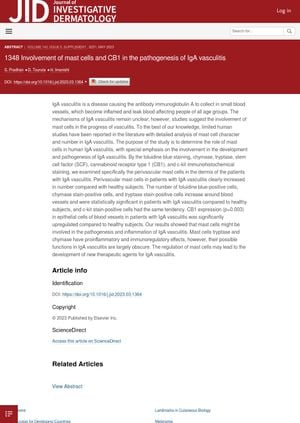Involvement of Mast Cells and CB1 in the Pathogenesis of IgA Vasculitis
April 2023
in “
Journal of Investigative Dermatology
”

TLDR Mast cells and the CB1 receptor may be key in causing IgA vasculitis.
IgA vasculitis is a disease where the antibody immunoglobulin A accumulates in small blood vessels, causing inflammation and blood leakage. The mechanisms behind this disease are not fully understood, but this study suggests that mast cells play a significant role in its development and pathogenesis. The researchers examined the perivascular mast cells in the dermis of patients with IgA vasculitis and found a significant increase in their number compared to healthy subjects. They also found a significant increase in the number of toluidine blue-positive cells, chymase stain-positive cells, and tryptase stain-positive cells around blood vessels in patients with IgA vasculitis. Additionally, the expression of the cannabinoid receptor type 1 (CB1) in the epithelial cells of blood vessels was significantly upregulated in patients with IgA vasculitis. These findings suggest that mast cells and CB1 might be involved in the inflammation and pathogenesis of IgA vasculitis, and that regulating mast cells could potentially lead to new treatments for this disease.



